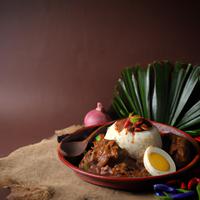
1 serving (300 grams) contains 600 calories, 25.0 grams of protein, 20.0 grams of fat, and 80.0 grams of carbohydrates.

Log this food in SnapCalorie

Nutrition Information
Calories |
472.4 | ||
|---|---|---|---|
% Daily Value* |
|||
| Total Fat | 15.7 g | 20% | |
| Saturated Fat | 7.9 g | 39% | |
| Polyunsaturated Fat | 0 g | ||
| Cholesterol | 39.4 mg | 13% | |
| Sodium | 629.9 mg | 27% | |
| Total Carbohydrates | 63.0 g | 22% | |
| Dietary Fiber | 2.4 g | 8% | |
| Sugars | 3.9 g | ||
| protein | 19.7 g | 39% | |
| Vitamin D | 0 mcg | 0% | |
| Calcium | 31.5 mg | 2% | |
| Iron | 2.4 mg | 13% | |
| Potassium | 236.2 mg | 5% | |
* Percent Daily Values are based on a 2,000 calorie diet. Your daily values may be higher or lower depending on your calorie needs.
Food Attributes
Source of Calories
About Nasi rendang
Nasi Rendang is a traditional dish originating from Minangkabau cuisine in Indonesia, beloved for its rich flavors and hearty ingredients. It consists of fragrant steamed rice paired with rendang, a slow-cooked spicy meat dish, often made with beef. The rendang is simmered in coconut milk and seasoned with a blend of aromatic spices, including turmeric, ginger, garlic, and lemongrass, which impart depth and complexity. While packed with protein and nutrients from the meat, nasi rendang can be high in saturated fats due to the use of coconut milk and oil. Spice blends contribute antioxidants and anti-inflammatory benefits, but the calorie content may be substantial depending on portion size. This dish is a flavorful celebration of Indonesian culinary heritage, offering a balance of taste and nutritional considerations for occasional indulgence. Opting for leaner cuts of meat or smaller portions can make it a bit more health-conscious.



